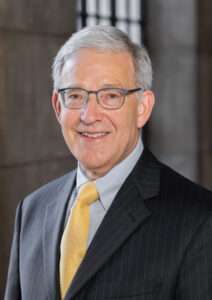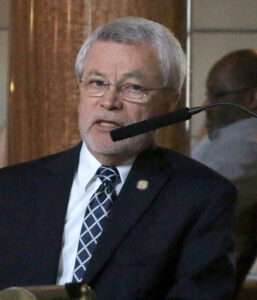
By PAUL HAMMEL
Nebraska Examiner
LINCOLN — Nebraska Secretary of State Robert Evnen, in often emphatic terms, rejected allegations Wednesday that the state’s ballot-counting machines could be hacked by “foreign adversaries.”
Evnen, testifying toward the end of an afternoon-long public hearing, said Nebraska’s ballot-counting machines are never connected to the internet and are designed so they cannot be connected to the internet, so they cannot be “hacked.”
He said the machines were recently certified by the U.S. Election Assistance Commission, an independent U.S. government agency created by the Help America Vote Act of 2002. Beyond that, Evnen said each machine is subject to three runs of “test decks” of ballots before each election, to ensure their accuracy.
No evidence
“There is no credible evidence to show our ballot counting machines have rendered a false result,” said the secretary, whose office conducts the state elections.
Evnen testified before the Legislature’s Government, Military and Veterans Affairs against a bill that would require extensive testing of each ballot-counting machine prior to an election to assure that it could not be somehow connected to the internet.
Evnen, a conservative Republican seeking re-election this year, said Legislative Bill 1121 was unnecessary and would be an “astronomical” waste of taxpayer money.
“I believe in the rule of law. I have dedicated my entire life and career to the rule of law,” Evnen said.
But those assurances were waved aside by a long line of testifiers who maintained that modern technology had advanced to the point that chip manufacturers in China or “malicious software updates” could implant ways to allow the machines to connect to the internet, leading to changing results of an election.
‘Where does the hardware come from?'
“That’s my concern. Where does the hardware come from?” said State Sen. Steve Halloran of Hastings, a member of the committee.
Evnen said Nebraska’s ballot counting machines are designed in Omaha, by engineers with Election Systems and Software. He encouraged Halloran and others who had doubts to visit the company and decide for themselves.

The exchange was the latest attempt by the secretary of state to address allegations — which Evnen said he has investigated and refuted — that there was widespread voter fraud in the 2020 elections in Nebraska and nationally.
Evnen produced a PowerPoint to shoot down the claims, one by one, earlier this year, and the assistant secretary of state for elections, Wayne Bena, met with members of a voter accuracy group and some state legislators Tuesday night to again address their claims.
‘Propaganda’
But while Evnen and Nebraska’s election system had several defenders during Wednesday’s legislative hearing, others testified that they did not believe him or the assurances of ES&S or the “propaganda” given by national election and Homeland Security officials.
“Of course he (Evnen) doesn’t think there’s any credible evidence,” said Jennivery Hicks, one of the critics. “Why does he trust the machines more than he trusts the people he represents?”
She was among those who suggested that the state return to hand counting ballots cast at elections, which numbered about 966,000 in 2020.
‘Massive change’
Kearney Sen. John Lowe said it could be done by two-person teams, counting at the precinct level.
While Evnen said it was up to the Legislature if it wanted to approve such a “massive” change, he opposed the hand counting idea. He doubted that enough poll workers would volunteer for such a task, meaning the state would have to pay them. And he questioned how much longer it would take.
Evnen also suggested that human-counted elections would be more susceptible to fraud because low-paid workers could be easily bribed to “transpose a couple of numbers.”
“I am opposed to putting someone in that situation,” he said.
Three bills, none prioritized
Three bills were considered by the committee on Wednesday:
- LB 1121, from Thurston Sen. Joni Albrecht, which would require inspections of machines to ensure they couldn’t be hacked via the internet.
- LB 1181, a bill introduced by recently resigned Sen. Mike Groene but picked up by Lowe. It would require showing a photo ID or a bank statement or utility bill dated within 60 days to vote at an election. It would also require a copy of an ID to be sent along with a mail-in ballot in a special, separate compartment so the name and address can be compared.
- LB 1123 from Bayard Sen. Steve Erdman, which would prohibit ballots from being counted until the polling places have closed on election night. That would prevent some early counting of ballots, which allows for posting of early returns when the polling places close.
None of the three bills were prioritized, meaning that they are unlikely to see floor debate this year.
Interim study
Gordon Sen. Tom Brewer, who chairs the Government Committee, said the committee will likely hold an interim study on the subject of election security.
Brewer, who brokered the meeting between election critics and Evnen’s office, said he’s concerned that the secretary is “pooh-poohing” the complaint, when he should be addressing critics face to face.
“He may not like what they say, but he needs to hear them out,” Brewer said, or else the complaints may grow.




